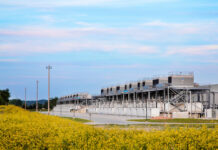By Anne Cosgrove
From the March/April 2023 Issue
In July 2022, Google announced that it would buy the iconic James R. Thompson Center in the heart of Chicago’s Loop with the intention of deepening its commitment to the company’s long-term presence in the state. Google noted how this effort will help advance the growth of its partners and customers throughout the Midwest and the nation. Located in the geographic center of North America, Chicago is home to the world’s second-largest financial center and anchors a state that ranks as the globe’s 18th-largest economy.

That same month, North America’s largest roofing manufacturer, GAF Commercial Roofing, announced plans to build an $80 million, 450,000-square-foot manufacturing facility in Peru, IL. The company noted Illinois’ skilled workforce and connected rail system as two key reasons for the decision.
Google and GAF join a variety of companies across industries that have recently committed to Illinois. For example, Ollie’s Bargain Outlet is building a new distribution center in Princeton, investing $68 million and creating 145 new full-time jobs. Kellogg’s announced plans to move the headquarters of its Global Snacking Company, with brands including Pringles and Pop-Tarts to Chicago. And LG Chem and ADM announced two planned joint ventures for U.S. production of lactic acid and polylactic acid in Decatur that will help meet the demand for plant-based products, including eco-friendly bioplastics.
These companies all cite similar reasons for choosing Illinois: the state is home to a deep, diverse talent pool, world-class infrastructure, sustainable energy, and easy access to global markets.
From advanced manufacturing to agribusiness, to life sciences, Illinois has the workforce that companies need to thrive. More than 35% of Illinoisans hold a bachelor’s degree or higher, and the state is home to 254 higher education institutions. Companies are drawn to the state because of its vast workforce, and the state continues to invest in its Manufacturing Training Academies.

Illinois Sites Are Ready
With more than 83% of the continental U.S. within a two-day truck drive, Illinois is the only state with all seven Class 1 railroads. It is also home to 19 port districts with direct links to the Atlantic Ocean, Great Lakes, and Gulf of Mexico. On top of it all, Illinois is within a four-hour flight of nearly the entire North American market, and Chicago’s O’Hare is ranked the most connected airport in the world.
And to provide companies information on available sites expeditiously, Intersect Illinois recently announced a new Vetted Sites program to streamline the site selection process for companies considering expansion and relocation and advance development for large properties throughout the state.
“As companies act on needs to ramp up large-scale production quickly, the availability of large sites that can handle their needs—from electricity, to water, to rail access—is critical to winning deals,” said Intersect Illinois CEO Dan Seals. “We’re fortunate to have many quality sites in Illinois and are working to make sure they are ready for large companies to set up rapidly.”
The site readiness program will provide site data to companies making location decisions in order for them to act quickly and accurately. Vetted sites will be distinguished on Intersect Illinois’ searchable database of available properties.
The State of Illinois is also supporting the development of large sites with a new grant program to assist with site readiness. Governor JB Pritzker recently announced $40 million in Rebuild Illinois Capital Funds to supercharge the development of large, developed sites ready for occupancy for manufacturers, distribution centers, industrial centers, and more.
The Land of Lincoln is home to legacy companies including Abbott, John Deere, State Farm, and Walgreens. It is also home to disrupters such as Lion Electric, which is building its electric buses at the largest facility of its kind in the U.S. in Joliet. There’s also Rivian, which employs 6,000 people building electric trucks and SUVs in Normal. And startups, such as Natural Fiber Welding, Nanograf, and Project 44, are developing the technology of the future in industries that include synthetic biology, batteries, and TDL.















![[VIDEO] Get More for Your Business in Ardmore. Oklahoma](https://businessfacilities.com/wp-content/uploads/2024/02/maxresdefault-324x160.jpg)
